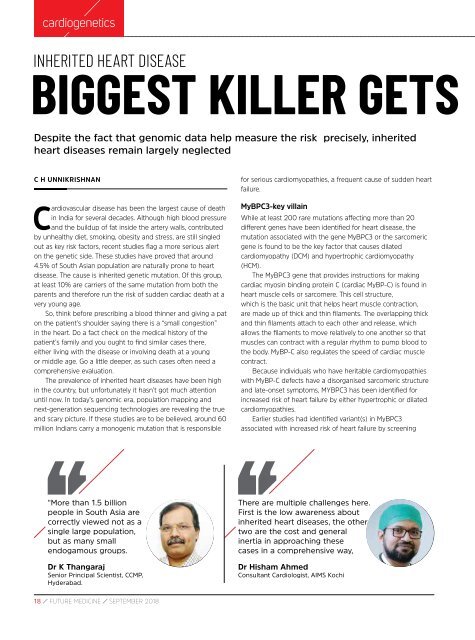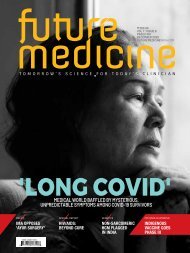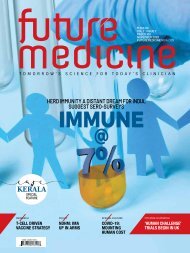FM SEPTEMBER 2018 ISSUE - digital edition
You also want an ePaper? Increase the reach of your titles
YUMPU automatically turns print PDFs into web optimized ePapers that Google loves.
cardiogenetics<br />
INHERITED HEART DISEASE<br />
BIGGEST KILLER GETS<br />
Despite the fact that genomic data help measure the risk precisely, inherited<br />
heart diseases remain largely neglected<br />
C H UNNIKRISHNAN<br />
Cardiovascular disease has been the largest cause of death<br />
in India for several decades. Although high blood pressure<br />
and the buildup of fat inside the artery walls, contributed<br />
by unhealthy diet, smoking, obesity and stress, are still singled<br />
out as key risk factors, recent studies flag a more serious alert<br />
on the genetic side. These studies have proved that around<br />
4.5% of South Asian population are naturally prone to heart<br />
disease. The cause is inherited genetic mutation. Of this group,<br />
at least 10% are carriers of the same mutation from both the<br />
parents and therefore run the risk of sudden cardiac death at a<br />
very young age.<br />
So, think before prescribing a blood thinner and giving a pat<br />
on the patient’s shoulder saying there is a “small congestion”<br />
in the heart. Do a fact check on the medical history of the<br />
patient’s family and you ought to find similar cases there,<br />
either living with the disease or involving death at a young<br />
or middle age. Go a little deeper, as such cases often need a<br />
comprehensive evaluation.<br />
The prevalence of inherited heart diseases have been high<br />
in the country, but unfortunately it hasn’t got much attention<br />
until now. In today’s genomic era, population mapping and<br />
next-generation sequencing technologies are revealing the true<br />
and scary picture. If these studies are to be believed, around 60<br />
million Indians carry a monogenic mutation that is responsible<br />
for serious cardiomyopathies, a frequent cause of sudden heart<br />
failure.<br />
MyBPC3-key villain<br />
While at least 200 rare mutations affecting more than 20<br />
different genes have been identified for heart disease, the<br />
mutation associated with the gene MyBPC3 or the sarcomeric<br />
gene is found to be the key factor that causes dilated<br />
cardiomyopathy (DCM) and hypertrophic cardiomyopathy<br />
(HCM).<br />
The MyBPC3 gene that provides instructions for making<br />
cardiac myosin binding protein C (cardiac MyBP-C) is found in<br />
heart muscle cells or sarcomere. This cell structure,<br />
which is the basic unit that helps heart muscle contraction,<br />
are made up of thick and thin filaments. The overlapping thick<br />
and thin filaments attach to each other and release, which<br />
allows the filaments to move relatively to one another so that<br />
muscles can contract with a regular rhythm to pump blood to<br />
the body. MyBP-C also regulates the speed of cardiac muscle<br />
contract.<br />
Because individuals who have heritable cardiomyopathies<br />
with MyBP-C defects have a disorganised sarcomeric structure<br />
and late-onset symptoms, MYBPC3 has been identified for<br />
increased risk of heart failure by either hypertrophic or dilated<br />
cardiomyopathies.<br />
Earlier studies had identified variant(s) in MyBPC3<br />
associated with increased risk of heart failure by screening<br />
“More than 1.5 billion<br />
people in South Asia are<br />
correctly viewed not as a<br />
single large population,<br />
but as many small<br />
endogamous groups.<br />
Dr K Thangaraj<br />
Senior Principal Scientist, CCMP,<br />
Hyderabad.<br />
There are multiple challenges here.<br />
First is the low awareness about<br />
inherited heart diseases, the other<br />
two are the cost and general<br />
inertia in approaching these<br />
cases in a comprehensive way,<br />
Dr Hisham Ahmed<br />
Consultant Cardiologist, AIMS Kochi<br />
18 / FUTURE MEDICINE / <strong>SEPTEMBER</strong> <strong>2018</strong>


















